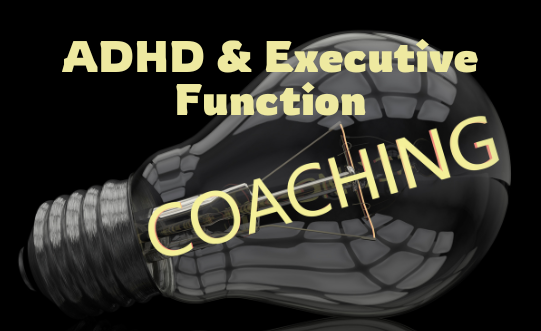Hello, wonderful readers! Today, we’re diving into the world of ADHD and Executive Function coaching—a lifeline for many navigating the stormy seas of ADHD. If you’ve ever wondered what this coaching is all about, how it can help, and why it’s different from therapy, you’re in the right place. So grab a cup of coffee (or maybe some herbal tea to keep that hyperactivity in check), and let’s explore this fascinating and transformative approach together.
What is ADHD Coaching?
ADHD coaching is a specialized form of life coaching tailored to meet the unique needs of individuals with Attention Deficit Hyperactivity Disorder (ADHD). Unlike therapy, which delves into the emotional and psychological roots of issues, ADHD coaching is all about practical, actionable steps to help clients achieve their goals and manage daily challenges.
Think of an ADHD coach as your personal cheerleader, strategist, and accountability partner all rolled into one. They help you harness your strengths, develop new skills, and create systems that work with your brain, not against it. Whether it’s organizing your life, managing time effectively, or improving focus, an ADHD coach provides the tools and support you need to thrive.
Executive Function Coaching: A Close Cousin
Executive function coaching focuses specifically on enhancing the brain’s executive functions—those high-level cognitive processes that enable us to get stuff done, plan, organize, prioritize, manage time, and regulate emotions. These skills are like the CEO of your brain, directing your attention, managing your impulses, and helping you make decisions.
For individuals with ADHD, these executive functions often need a bit of extra help. However, it’s important to note that you don’t need an ADHD diagnosis to struggle with executive function skills. Many people without ADHD find it challenging to stay stay focused, initiate and complete tasks, be organized, manage time, or regulate their emotions, particularly in high-stress environments or when juggling multiple responsibilities.
An executive function coach helps clients develop strategies to improve these skills, making it easier to juggle responsibilities, stay on top of tasks, and achieve long-term goals. It’s like having a mental workout buddy who ensures you stay on track and build those cognitive muscles!
This type of coaching can be incredibly beneficial not just for those with ADHD, but also for anyone looking to enhance their productivity, manage their time more effectively, or simply calm the chaos and bring more order to their lives. Whether you’re an overwhelmed professional, a busy parent, or a student facing academic challenges, executive function coaching can provide the structure and support needed to reach your goals.
Typical Challenges Tackled During Coaching
Clients come to ADHD and executive function coaching with a variety of challenges. Here are some common ones:

- Time Management: Struggling to prioritize tasks, meet deadlines, or manage schedules is a hallmark of ADHD. Coaches help clients create realistic timelines, set reminders, and develop routines that stick.
- Organization: From cluttered desks to chaotic digital files, organization can be a major hurdle. Coaches assist in developing systems for organizing physical spaces and digital environments.
- Procrastination: The infamous procrastination monster rears its head often for those with ADHD. Coaches work with clients to understand the root causes of procrastination and implement strategies to overcome it.

4. Focus and Attention: Maintaining focus, especially on mundane tasks, is a common challenge. Coaches help clients discover techniques to enhance concentration and sustain attention.
5. Impulse Control: Acting on impulse can lead to regret and complications. Coaches provide tools to improve self-regulation and decision-making processes.
6. Emotional Regulation: Managing emotions, particularly frustration and overwhelm, is crucial. Coaches offer strategies to help clients navigate their emotional landscapes more effectively.
Real-Life Examples
Let’s bring these concepts to life with some real-life examples (names changed for privacy, of course):
Example 1: Time Management
Meet Sarah, a graphic designer with ADHD who frequently misses deadlines. Her coach helps her break projects into smaller, manageable tasks and use visual timers to stay on track. They also create a color-coded calendar system, making deadlines more visible and less intimidating. With these new strategies, Sarah starts hitting her deadlines consistently, impressing her clients and boosting her confidence.
Example 2: Organization
Tom, a software developer, struggles with a cluttered workspace that hinders his productivity. His coach introduces him to the “one-touch rule”—handling items only once to reduce clutter. They also set up a weekly decluttering routine. Tom’s desk transforms from a chaotic mess to an organized, efficient workspace, allowing him to work more effectively.

Example 3: Procrastination
Lisa, a college student, has a habit of putting off assignments until the last minute. Her coach helps her understand that her procrastination is linked to perfectionism and fear of failure. Together, they set small, achievable goals and use a reward system for completing tasks on time. Lisa learns to tackle assignments earlier, reducing her stress and improving her grades.
Example 4: Focus and Attention
Mark, an entrepreneur, finds it hard to focus during long meetings. His coach introduces the “Pomodoro Technique”—working in focused intervals with short breaks. They also create a meeting agenda template to keep discussions on track. Mark’s newfound ability to maintain focus boosts his productivity and enhances his business performance.
Example 5: Impulse Control
Jane, a sales executive, often speaks out of turn in meetings, causing friction with her colleagues. Her coach teaches her mindfulness techniques and the “pause and plan” strategy—taking a moment to think before responding. Jane’s improved impulse control leads to more harmonious interactions and better team collaboration.
Example 6: Emotional Regulation
Alex, a high school teacher, feels overwhelmed by the demands of his job. His coach helps him identify triggers and develop coping mechanisms, such as deep breathing exercises and positive self-talk. Alex learns to manage his stress more effectively, resulting in a happier, more balanced life.
Coaching vs. Therapy: Understanding the Difference
While both coaching and therapy can be immensely beneficial, they serve different purposes:
Coaching:
- Focuses on practical, actionable steps to achieve specific goals.
- Emphasizes the present and future, rather than the past.
- Provides accountability and support for personal and professional growth.
- Uses tools and strategies to improve daily functioning and achieve success.
Therapy:
- Explores the emotional and psychological roots of issues.
- Addresses mental health concerns and past trauma.
- Helps clients understand and process their feelings.
- Often involves diagnosing and treating mental health conditions.
In a nutshell, coaching is like having a personal trainer for your brain, helping you tackle everyday challenges and reach your goals. Therapy, on the other hand, is more like working with a detective and healer, uncovering the deeper issues and healing emotional wounds.
The Benefits of Life Coaching for ADHD
Life coaching, especially with a coach who understands ADHD, offers numerous benefits:

- Personalized Strategies: Coaches tailor their approach to fit your unique needs and strengths, helping you develop systems that work specifically for you.
- Increased Self-Awareness: Coaching helps you understand how ADHD affects you, identify your strengths and weaknesses, as well as your life’s purpose.
- Goal Achievement: Coaches assist in setting realistic goals and creating actionable plans to achieve them, providing motivation and accountability. Whether it’s career advancement, living a more healthy lifestyle, or improving relationships, partnering with a life coach will help you achieve your goals both personally and professionally.
- Improved Productivity: With effective strategies in place, you can manage your time and tasks more efficiently, leading to increased productivity.
- Enhanced Confidence: Successfully managing ADHD challenges and achieving goals boosts self-esteem and confidence.
- Support and Accountability: Coaches offer ongoing support and hold you accountable, ensuring you stay on track and make progress.
Be Discerning When Choosing an ADHD Coach
It’s important to be discerning and careful when searching for an ADHD coach, as there’s no official licensing requirement for ADHD coaches just yet. Anyone can hang a sign on their door or create a website proclaiming themselves an ADHD coach, so it’s crucial to ask the right questions to determine their quality and qualifications.
Here are some questions you should ask a prospective ADHD coach:
- Did the Coach Graduate from an ADHD-Specific Coach Training Program?
- Ensure the coach has completed a reputable training program focused on ADHD coaching.
- Does the Coach Have Certification from PAAC (Professional Association for ADHD Coaches) and/or ICF (International Coaching Federation)?
- Certification from these organizations assures that the coach has met rigorous requirements for coach education, accumulated hours of coaching experience, undergone mentor coaching, and successfully completed a performance evaluation.
These questions will help you find a qualified coach who understands the nuances of ADHD and can provide the support you need to achieve your goals.
A Coach Who Gets It

Having a life coach who understands ADHD and its challenges can be a game-changer. They know the ins and outs of ADHD, including the quirks and superpowers that come with it. They can relate to your struggles and provide insights and strategies that truly resonate. With their support, you can turn your ADHD from a stumbling block into a stepping stone, achieving your life goals and living a more fulfilling, balanced life.
So, if you’re ready to harness your superpowers and tackle your ADHD head-on, consider partnering with an ADHD coach. It’s like having a trusty sidekick in your quest for success, offering guidance, support, and a healthy dose of humor along the way. After all, who says managing ADHD can’t be both effective and fun?
If you’re ready to explore coaching, I’d love to chat with you. You can schedule a free consultation with me at this link: https://square.site/book/YXCB6K12QWN9F/ascend-with-aviva-coaching I look forward to speaking with you soon!

